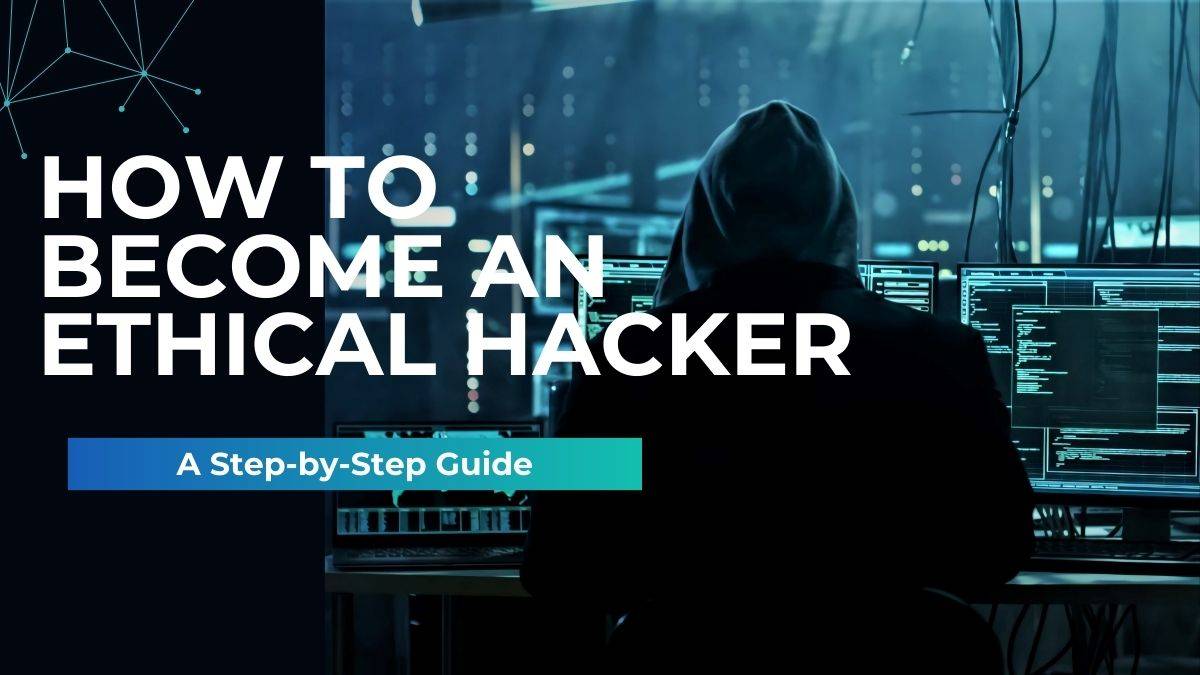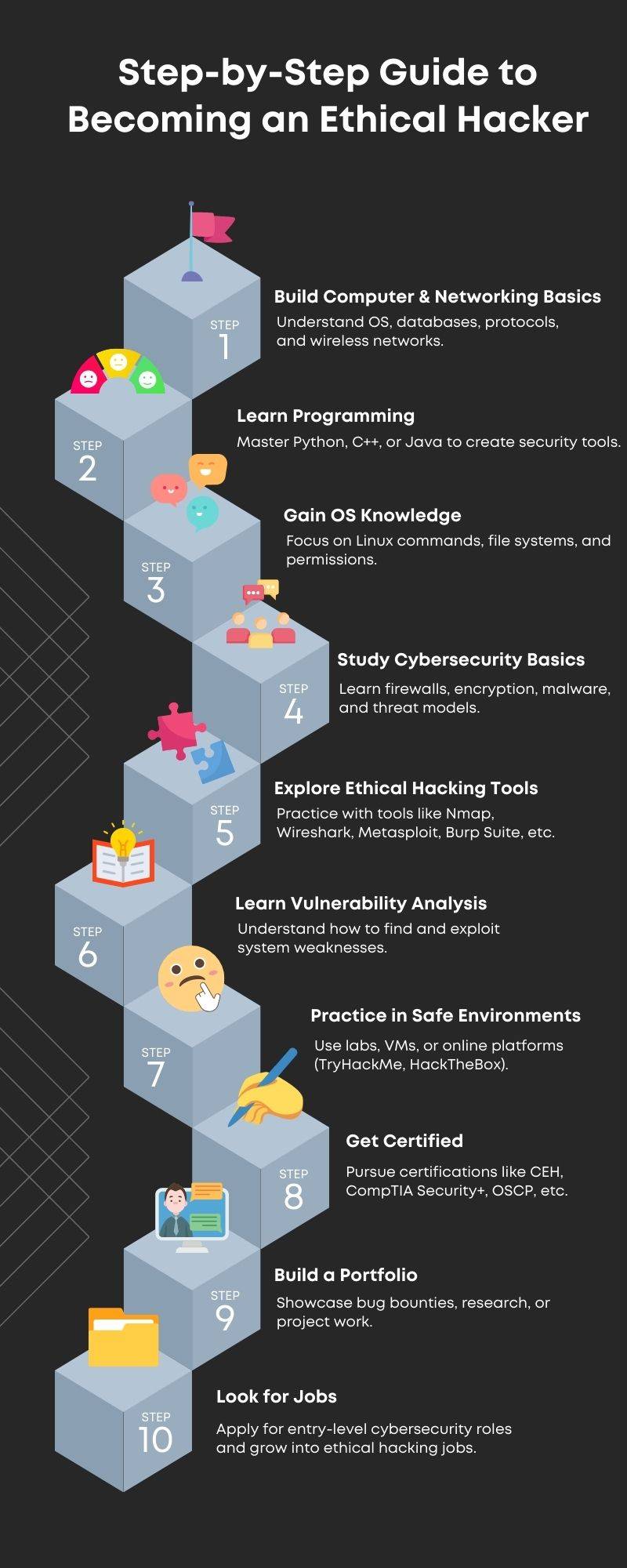How to Become an Ethical Hacker: A Complete Guide for Beginners
With the rise of the digital era, cyberattacks have become a menace to corporations, governments, and people in general. Each time we shop online, use any kind of banking application, or keep our files online, we need the systems to keep our data safe. Still, there are hackers who want to penetrate those very systems. Here is when the ethical hackers come into the picture. In this blog, we have covered how to become an ethical hacker.
- What is an Ethical Hacker?
- Why Choose a Career in Ethical Hacking?
- How to Become an Ethical Hacker: Step-by-Step Guide
- Top Skills You Need to Become an Ethical Hacker
- Educational Pathways and Certifications for Ethical Hackers
- Ethical Hacking Tools & Technologies
- Ethical Hacking Top Job Roles
- Average Ethical Hacking Salary
- Career Growth and Future Scope in Ethical Hacking
- Tips for Ethical Hacking Beginners
- Conclusion
What is an Ethical Hacker?
An ethical hacker is a trained professional who works to protect computer systems and networks against malicious or unauthorised attacks. They apply their expertise to find existing security issues and block unethical hackers from accessing private information in organisational systems.
An ethical hacker uses the same skills as those employed by unethical hackers; the only difference is that the former protects data from misuse and identifies weak areas in the system. They are a part of the network security team in any organisation and have access to everyone’s computer system to ensure maximum information security.
What Does an Ethical Hacker Do?
An ethical hacker, or a white-hat hacker, is a professional who works for businesses and institutions to safeguard their digital assets. Their main job is to simulate cyberattacks and test security systems. They think like a hacker but act with permission and responsibility. Primary job role of an ethical hacker is the following.
- To design penetration testing and risk assessment scripts for checking system and network vulnerabilities
- To maintain a check over sniffing networks, broken wireless encryptions, hijacked web applications and servers
- To secure intrusion detection systems, intrusion prevention systems and firewalls to make sure no malicious action
- To maintain vulnerable data under control and repair any intrusions
- To build low-level tools for enhancing security monitoring and evaluation
- To build extensive reports of recent security findings and disseminate them throughout the cross-functional teams
- To perform risk assessment across all the hardware and software systems present in the organisational network
- To document and implement security policies and best practices for digital protection
In short, ethical hackers ensure systems are secure and reliable.
Why Choose a Career in Ethical Hacking?
- As demands for information security professionals are increasing both in the public and private sectors, new job roles are emerging.
- The job market for skilled ethical hackers is booming. Pursuing a job-relevant ethical hacking course could get you a 50-70% hike.
- Opportunity to work with big brand names like Visa, Cisco, Oracle, Reliance, GE, American Express, to name a few.
- An excellent opportunity to network with new people and industry experts, and grab new opportunities

How to Become an Ethical Hacker: Step-by-Step Guide
Starting a career in ethical hacking requires planning and dedication. Here’s a simple roadmap:
- Familiarize yourself with programming languages: Knowledge of at least one language like Python, Ruby, C++, and Java will help you create your own security tools based on the available situations.
- Understand operating systems: Be familiar with operating systems, such as Linux. Learn structure of the file system and paths, the use of the command line, and managing permissions.
- Learn cybersecurity fundamentals: Basic cybersecurity concepts such as firewalls, encryption, and malware are necessary to understand ethical hacking.
- Hacking tools: Learn about tools like Nmap, Metasploit, Burp Suite, John the Ripper, Wireshark, Acunetix, Aircrack-ng, and CrackMapExec, etc.
- Learn to Identify Scenario: Identifying and exploiting system and application vulnerabilities forms the base of offensive security.
- Practice hands-on hacking.
- Get certified: Short-term certification courses and certifications in ethical hacking can help you add to your knowledge and increase your credibility.
- Create a portfolio: Make an impressive online portfolio documenting your bug bounty, security research, or projects that will showcase your skills to potential employers.
- Apply for jobs: Start with entry-level jobs, then move into full-time ethical hacking roles.
Top Skills You Need to Become an Ethical Hacker
In order to become successful in your career as an ethical hacker, you would require both technical and soft skills.
Technical Skills
- Networking: Most cyber threats originate in networks. You should know all the devices on the network, how they interconnect, and how to determine if any system has been compromised. You must have a thorough knowledge of TCP/IP, DNS, firewalls, and protocols.
- Operating Systems: especially Unix, Linux and Windows.
- Cryptography: Fundamentals of Encryption and Hashing Methods
- Web Application Security
- Vulnerability assessment: A process of utilising tools to locate weaknesses in the systems
- Programming knowledge: Knowledge of programming languages such as Python, Java, and C++. Understanding of scripting languages like Bash.
- Databases: Attacks generally target databases. Thus, knowing database management systems like SQL will enable you to audit operations.
Soft Skills
- Be Proactive: Look for security risks before they cause problems.
- Good at Problem-Solving: Effectively investigate and figure out what went wrong.
- Stay Updated: Know the current best practices and methods in security.
- Strong Communication Skills: Clearly present information and ideas to others.
Educational Pathways and Certifications for Ethical Hackers
As of 2025, there is no specialised degree program in ethical hacking. There are multiple educational paths you can pursue to become an ethical hacker.
- Undergraduate Courses: A bachelor’s degree (B.Sc., B.Tech, BE, BCA) in IT or Computer Science will help you develop the basic knowledge of programming, networking, and system security.
- Postgraduate Courses: Pursuing an MCA in Cyber Security or any other specialised graduate level courses in cybersecurity enhances both advanced knowledge and practical skills.
- Professional Certifications: Certifications play an essential role in becoming an ethical hacker. Some popular ethical hacking certifications are -
- CEH (Certified Ethical Hacker): Focuses on penetration testing as well as vulnerability assessment.
- CompTIA Security+: Covers basic security skills and is for beginners.
- OSCP (Offensive Security Certified Professional): Most famous for its practical and hands-on style, this certification is highly rated for the application of real-world hacking methods.
- CISSP (Certified Information Systems Security Professional): Advanced, focusing on information security management.
Ethical Hacking Tools & Technologies
Ethical hackers use a combination of software tools to perform security testing. Popular ones include:
- Nmap for Network scanning and mapping
- Wireshark for Packet analysis and network troubleshooting
- Metasploit, an exploitation framework for penetration testing
- Burp Suite for web application security testing
- Kali Linux, a popular Linux distribution with pre-installed security tools
- John the Ripper to crack passwords
- Nessus, a vulnerability assessment tool
Ethical Hacking Top Job Roles
| Job Role |
Description |
Average Salary |
| Penetration Tester |
Conducts penetration testing on systems, networks, and applications |
INR 2.4 - INR 19 LPA |
| Security Analyst |
Detects possible security incidents and manages the incident response |
INR 3 - INR 11.1 LPA |
| Cybersecurity Consultant |
Helps businesses evaluate their cybersecurity threats and enhance their defences |
INR 3.6 - 24.5 LPA |
| Network Security Engineer |
Designs and constructs secure network architectures |
INR 3 - 15.9 LPA |
| Information Security Manager |
Develops and enforces security policies; manages security teams |
INR 9.3 - 43.4 LPA |
| Bug Bounty Hunter |
Safeguards and reports bugs on bounty programs for rewards |
INR 4.2 - 10.5 LPA |
| Forensic Analyst |
Conducts cybercrime investigations and collects digital evidence for court. |
INR 2.2 - 10 LPA |
| Malware Analyst |
Examines viruses and other malware to analyse their behaviour and develop countermeasures |
INR 2.1 - 25 LPA |
| Vulnerability Assessor |
Conducts systems audits to catalogue and evaluate vulnerabilities |
INR 3.4 - 18 LPA |
| Application Security Engineer |
Protects software and applications throughout their development and deployment lifecycle |
INR 3.1 - 33 LPA |
| SOC Analyst (Security Operations Centre Analyst) |
Works in a SOC to monitor, analyse, and respond to incidents in real time |
INR 3.3 - 15 LPA |
| Incident Responder |
Manages and contains a security incident or a cyberattack |
INR 3 - 18 LPA |
| Chief Information Security Officer (CISO) |
A CISO is an organisation's top position |
INR 17.7 - 94 LPA |
These roles allow professionals to specialise and grow within cybersecurity.
Average Ethical Hacking Salary
Ethical hackers are becoming more and more necessary in organisations where IT security is their top priority or where information is their core asset. So, based on the skill of the hacker, years of experience, and the needs of the business, the salary for ethical hacking differs.
- Entry-level professionals can expect a salary of around INR 3 - 6 LPA.
- Mid-level roles with 3 - 5 years of experience earn an annual salary of around INR 7 - 15 LPA.
- Experienced ethical hackers earn over INR 20 LPA.
Globally, salaries are even higher. In the US and Europe, ethical hackers can earn anywhere between $70,000 - 120,000 annually.
Career Growth and Future Scope in Ethical Hacking
The future of ethical hacking is promising. As businesses are turning digital, there is a greater need for skilled security professionals than ever. New specialities are Cloud security, IoT security, AI-powered cybersecurity, and Incident response teams.
Tips for Ethical Hacking Beginners
If you are starting as an ethical hacker, follow these practical tips.
- Learn the basics of computers and networks
- Use free available tools. Most of the online resources are offering beginner-friendly cybersecurity labs; use them!
- Always practice in legally accepted ways and on ethical platforms or home labs; never on live systems
- Try different kinds of hacking tools and software to gain expertise
- Join online ethical hacking and cybersecurity groups and forums to learn from others
- Build a portfolio that showcases your skills and knowledge
Conclusion

 Call 8585951111
Call 8585951111



Rashmi Karan is a writer and editor with more than 15 years of exp., focusing on educational content. Her expertise is IT & Software domain. She also creates articles on trending tech like data science,